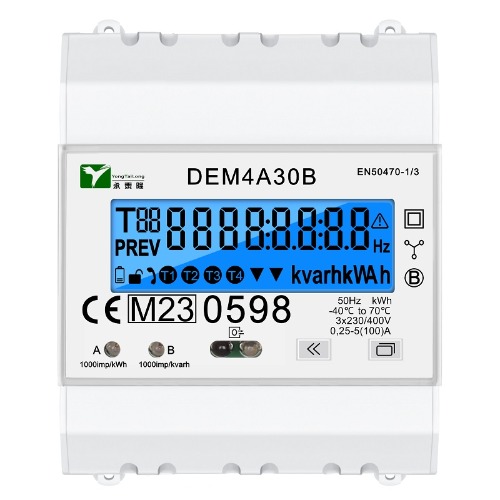
The EV charging energy meter is mainly used to measure the charging energy provided by new energy EV chargings, as well as record the usage and fees of the EV chargings. During use, the energy meter will quantify and monitor the energy, time, and cost information of consumers' charging process through its own calculations. At the same time, the EV charging energy meter can also record the operation status and equipment failure information of the EV charging, allowing for status monitoring and fault alarm.
The EV charging energy meter should have the following elements:
Measurement accuracy: The energy measurement accuracy of the EV charging must reach level 0.5 or level 1, so the selected energy meter must also meet the corresponding accuracy requirements.
Adaptability to current range: The current range of AC EV chargings is generally 16A, 32A, 64A, etc., so the selected energy meter needs to be able to adapt to these different current ranges.
Reverse connection protection: The EV charging energy meter needs to have reverse connection protection function to prevent damage to the energy meter caused by mistakenly connecting wires.
Lightning protection: The EV charging energy meter needs to have a certain level of lightning protection capability to prevent damage to the energy meter caused by lightning strikes and other reasons.
Communication interface: The EV charging energy meter needs to have a communication interface to facilitate remote monitoring and management of the EV charging. The common communication method is RS485, and the selection of communication interface can be customized according to actual needs. RS485 communication is mainly used for data and information exchange between the EV charging and the EV charging energy meter.
Measurement of energy consumption: By measuring the energy consumption of the EV charging, the amount of electricity used by the EV charging can be calculated. This is not only important for users to calculate charging costs, but also very helpful for energy suppliers to calculate electricity consumption and fees.
Record usage: The EV charging energy meter can also record the usage of the EV charging, including the number of uses, charging time, charging amount, etc. This helps energy suppliers, EV charging operators, and regulatory authorities understand the usage of EV chargings in order to ensure electricity safety and energy conservation.
The EV charging energy meter also has different types. Common types of EV charging energy meters include single-phase meters, three-phase meters, smart meters, prepaid meters, etc. Different types of meters have different characteristics and application ranges, and users can choose the suitable meter type according to their needs. When using the EV charging energy meter, attention should be paid to correct wiring, regular testing, and maintenance to avoid damage to the meter or improper use.

 English
English 简体中文
简体中文



.png?imageView2/2/w/500/h/500/format/png/q/100)





.jpg?imageView2/2/w/500/h/500/format/png/q/100)




